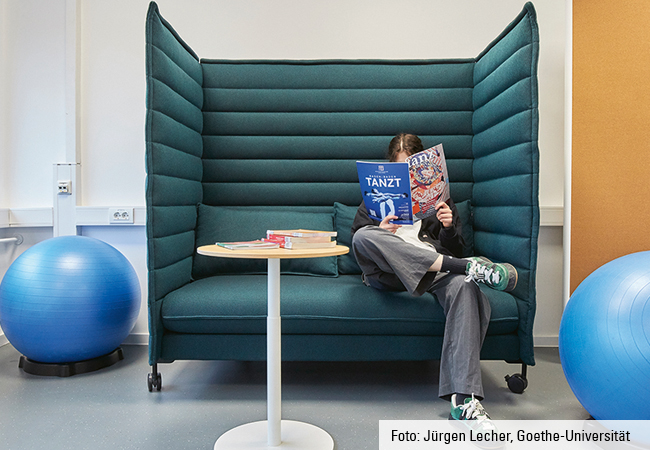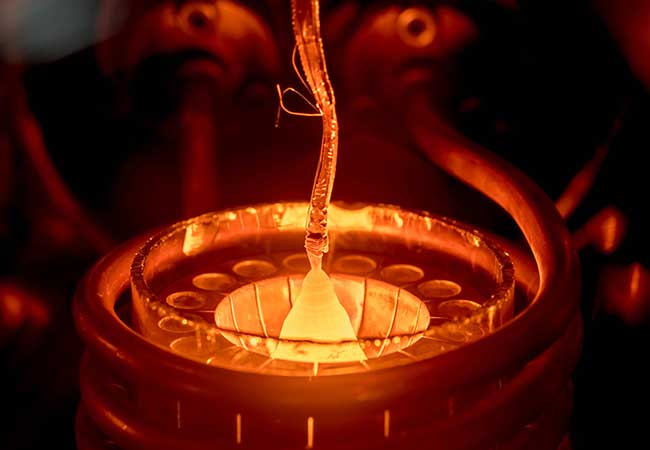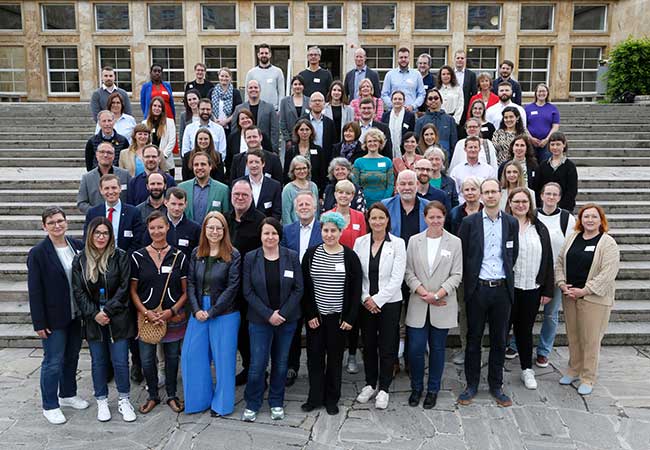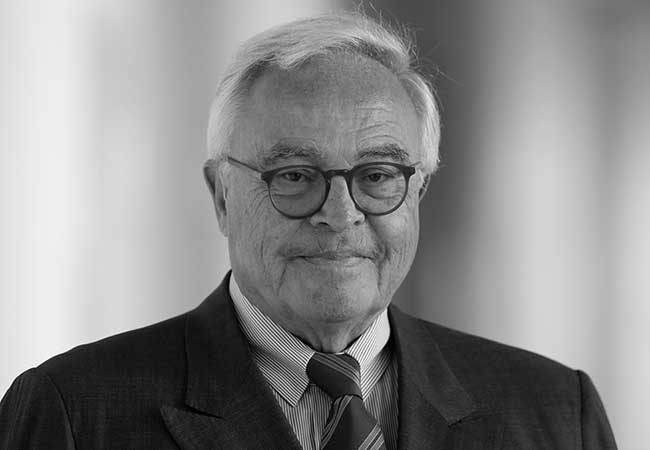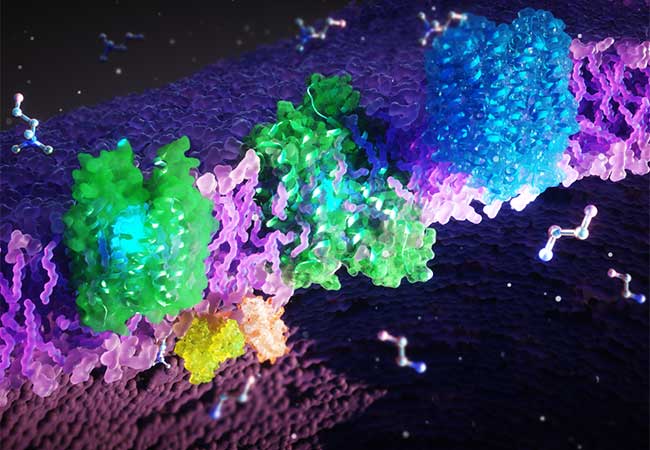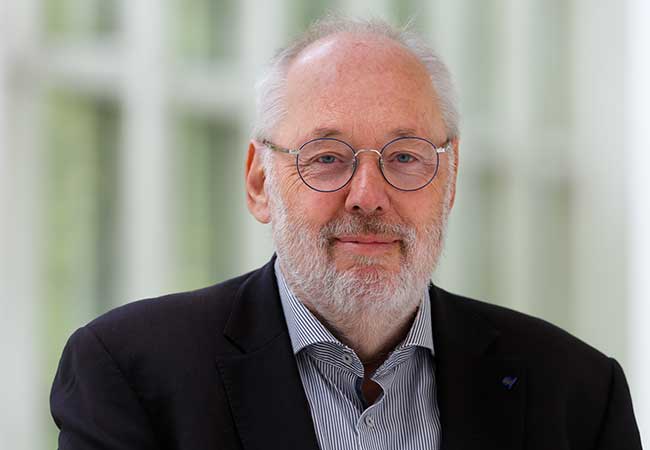Postdocs Julia Schubert and Steven Gonzalez are members of the interdisciplinary Research Training Group “Fixing Futures”. Their research centers on the question of how visions of the future affect the here and now.
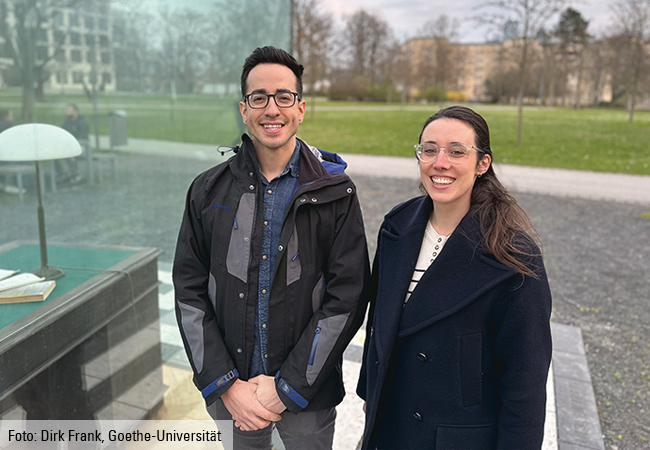
(Photo: Dirk Frank)
What will the future be like? Considering the large number of current crises, conflicts and uncertainties, the question of what the world will look like in 50 or 100 years is becoming increasingly urgent. Can new technologies make the world safer and more stable? What is the outlook for the global climate: Are we already past the tipping point? And, – considering the multitude of different influencing factors and their dynamics – can the future be predicted at all? The Research Training Group (RTG) “Fixing Futures: Technologies of Anticipation in Contemporary Societies,” established at the Institute of Sociology in 2023 with funding from the German Research Foundation (DFG), addresses questions of how the future is imagined and modelled, and thus “anticipated.” Its team includes ten doctoral students, two postdocs and eight principal investigators (PIs).
“We’re interested in conceptions of the future, and more particularly in how these are developed within a wide variety of different scientific disciplines,” explains Dr. Steven Gonzalez, who, like fellow researcher Dr. Julia Schubert, works as a postdoc at “Fixing Futures”. “We don’t claim to be able to predict the future ourselves. Instead, we take a step back and examine ideas about the future as discourses, practices or performances that also have an effect on the way the future is shaped. In a way, each such conception offers a destination to which the world is heading. We are skeptical of such ideas, not least since we are certain that there is no such thing as just one future.”
The “Fixing Futures” Research Training Group sees the future as a dynamic subject meriting both historical and empirical analysis. “Anticipating the future, including as part of a scientific project, is always a political undertaking. We look at how this knowledge about the future is generated and transmitted, and in turn also shapes the future”, Schubert explains. While one might initially assume that “Fixing Futures” is very theory-based, the two postdocs disagree: “Of course our workshops also examine important theories from the fields of philosophy and social science, but our RTG sees itself as decidedly empirical. We want to look at the future and its models ‘in action’ precisely because we assume that a large number of possible futures exist, not all of which are necessarily arranged on a linear timeline.”
Observing and learning
Gonzalez outlines the methodological approach by pointing to his own dissertation project, called “Cloud Ecologies”, at the Massachusetts Institute of Technology (MIT), as part of which he investigated the ecological and political impacts of data centers. In addition to learning the practical details of very sophisticated storage technologies, he also looked at the human dimension, including what we can learn about computer centers by observing the daily practices of the people maintaining them. “Ethnography is a research method based on participant observation, during which researchers immerse themselves in the lives of their research subjects and objects,” Gonzalez explains. In addition to an open mind, such an approach also requires extreme patience, he emphasizes. “You really have to listen to people, and sometimes also be able to immerse yourself in a complex technical user manual.” One of his research interests at Goethe University Frankfurt is the ecological damage caused by data centers. “I see data storage as a technology for the future because we believe that today’s data will be needed at some point, even if we are not sure what for. We are already witnessing the emergence of technological alternatives to silicon-based computer systems that promise not only a much smaller ecological footprint, but also superior longevity in terms of the media used,” he adds.
Schubert specializes in the sociology of science, with a particular focus on climate research, and is currently investigating “attribution research”, i.e. climate scientists trying to attribute individual extreme weather phenomena to anthropogenic climate change. She is particularly interested in how this relatively new research field makes climate change comprehensible, and what influence this has on current climate policy. “My dissertation focused on ‘climate engineering’ measures, which address climate change as a global phenomenon. Examples include minimizing the insolation reaching the Earth or using negative emissions to increase the global carbon budget. Part of my current research consists of investigating the opposite perspective: In looking for the cause of extreme weather events, scientists focus on the climate in the weather, seeking to isolate the impacts of climate change on very specific weather events such as floods and heat waves. Some even go so far as to quantify individual countries’ or even individual companies’ contributions to specific heat waves. In addition to finding out more about how this research field developed, I’m most interested in the interplay between scientific inquiry and political challenges.”
Schubert was recently able to discuss her work with leading climate scientists. Asked whether they are critical of such a sociological view of their work, she says: “The discussion was very fruitful. All of them are very much aware of the politically explosive nature of their work and of course also the complex relationship between science and politics.” Natural scientists are particularly interested in discussing the social-policy implications of their work, Gonzalez and Schubert have found.
Diversity in practice: from science fiction to UNESCO
Interdisciplinarity and multidisciplinarity play an important role in “Fixing Futures”, with some of the group’s young researchers specializing in human geography, while others have a background in anthropology or sociology. Schubert appreciates this interdisciplinary approach: “The workshops, labs and lecture series give doctoral students insights into how other disciplines approach their research, in a setting that does not require you to compromise on your own disciplinary identity or seeks to obscure the existence of different approaches.”
Gonzalez’ family comes from Puerto Rico. “My origin and identity definitely have a huge impact on my writing and research. I often visit Puerto Rico as part of my research investigating how IT infrastructures reproduce local injustices and inequalities. As in other countries located in what is often referred to as the ‘global South’, here, too, technical infrastructures often reinforce both historical and contemporary colonial power structures.” Gonzalez also derives scientific ideas and findings from literature, pointing out that its speculative nature also constitutes a method of analyzing the future. “Many scientists have started thinking about the potentials of fiction. If we consider scientists’ and politicians’ ideas about the future as socially relevant, the visions of writers should also be heard and taken seriously.”
Schubert’s research also extends beyond the scientific context. In 2022, she was appointed to UNESCO’s World Commission on the Ethics of Scientific Knowledge and Technology (COMEST), which also works on climate engineering – Schubert’s specialty. Its report on the controversial potential consequences and ethical challenges of targeted climate intervention was completed and presented to the UN Member States at the last UN Climate Change Conference. The next subject on the commission’s agenda is human expansion in space.
The researchers in “Fixing Futures” would like to engage in a discussion about the research results as well as other unanswered questions with other disciplines and the wider public. “I see myself as a public scholar,” Gonzalez emphasizes. While making his knowledge accessible to a range of target groups is indeed very challenging, this is also necessary, he says, since it ensures that his own research remains pragmatic and useful, and not confined to specialist journals. There have already been promising initial discussions, including with Goethe University’s Museum Giersch about an exhibition. “Everyone thinks about the future in some form or another – especially in non-university settings. Learning more about these different perspectives, motives and interests is hugely enriching – not just for us, but above all for our research,” Schubert underscores.
“Fixing Futures” https://fixingfutures.eu






